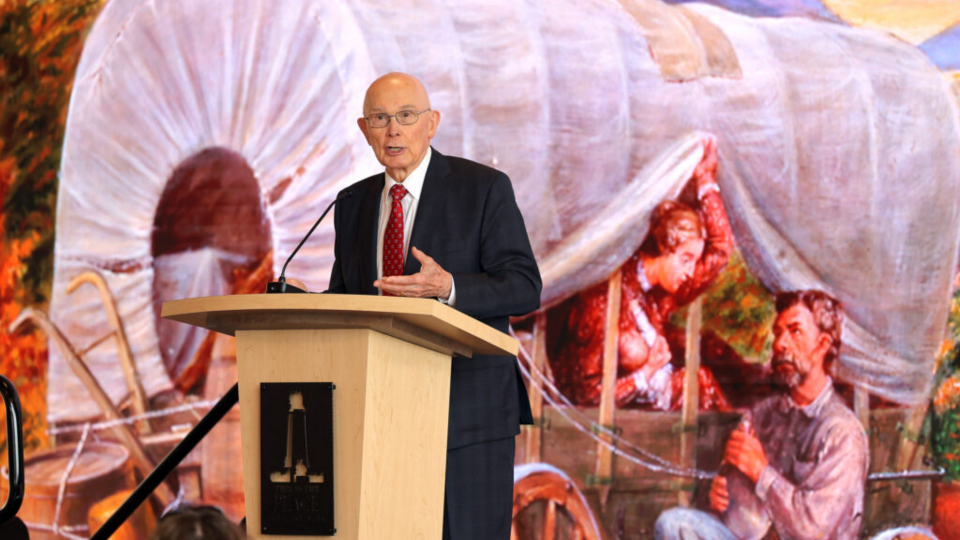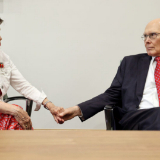| President Dallin H. Oaks, first counselor in the First Presidency, speaks at SUPer DUPer Day inside the newly dedicated Pioneer Center on the grounds of This is the Place Heritage Park in Salt Lake City on Monday, July 19, 2021. Photo by Scott G Winterton, courtesy of Church News. Copyright 2021 Deseret News Publishing Company. | 1 / 12 |
This story appears here courtesy of TheChurchNews.com. It is not for use by other media.
By Sydney Walker, Church News
It is not enough to study, praise or reenact the accomplishments of pioneers, said President Dallin H. Oaks while standing against a brightly colored backdrop of a covered wagon in the Pioneer Center at This Is the Place Heritage Park in Salt Lake City.
“We need to identify the eternal principles they applied for our benefit and then apply those principles to the challenges of our own day,” said President Oaks, first counselor in the First Presidency.
“In that way we honor their pioneering, and we also reaffirm that heritage and strengthen its capacity to bless our own posterity and millions of others in this troubled world. We are all pioneers when we do so.”
President Oaks was the keynote speaker for SUPer DUPer Day on Monday, July 19, an annual celebration at This Is the Place Heritage Park for the families of the Sons of Utah Pioneers and the Daughters of Utah Pioneers. He was accompanied by his wife, Sister Kristen M. Oaks. President M. Russell Ballard, Acting President of the Quorum of the Twelve Apostles, dedicated the Pioneer Center in March.
During his remarks, President Oaks emphasized many traits and principles gleaned from the examples of pioneers that can help in facing modern challenges.
One of those principles is inclusion. “The pioneer legacy is a legacy of inclusion,” President Oaks declared.
“We live in a time when inclusion is needed — in political relations, in cultural relations, in legal relations — and it’s not forthcoming in our society,” he told the Church News after the event. “As a Church and as a culture, we need to lead out in demonstrating inclusion, not descent, diversity, diversion or opposition.”
Pioneer Heritage
President Oaks began by sharing the stories of several of his family’s pioneer ancestors: Addison Everett, Hyrum Oaks, Emer Harris, Orange Seely, Anson Call, John S. White, Mary Fielding Smith and Joseph F. Smith.
“Their heritage of faith, strength and determination shapes who we are today,” he said.
President Oaks then spoke of the extreme opposition early Church members faced for practicing polygamy, but then highlighted an official U.S. government report from 1852 that was, in fact, entirely positive.
Capt. Howard Stansbury, a U.S. Army engineer assigned to survey the Great Basin, and his party of 18 became well acquainted with Latter-day Saint pioneers who sheltered them in Salt Lake City in the hard winter of 1849-50. Among his 267-page report are these observations:
“In their dealings with the crowds of emigrants that passed through their city, the Mormons were ever fair and upright, taking no advantage of the necessitous condition of many, if not most of them. … In short, these people presented the appearance of a quiet, orderly, industrious and well-organized society, as much so as one would meet in any city of the Union.”
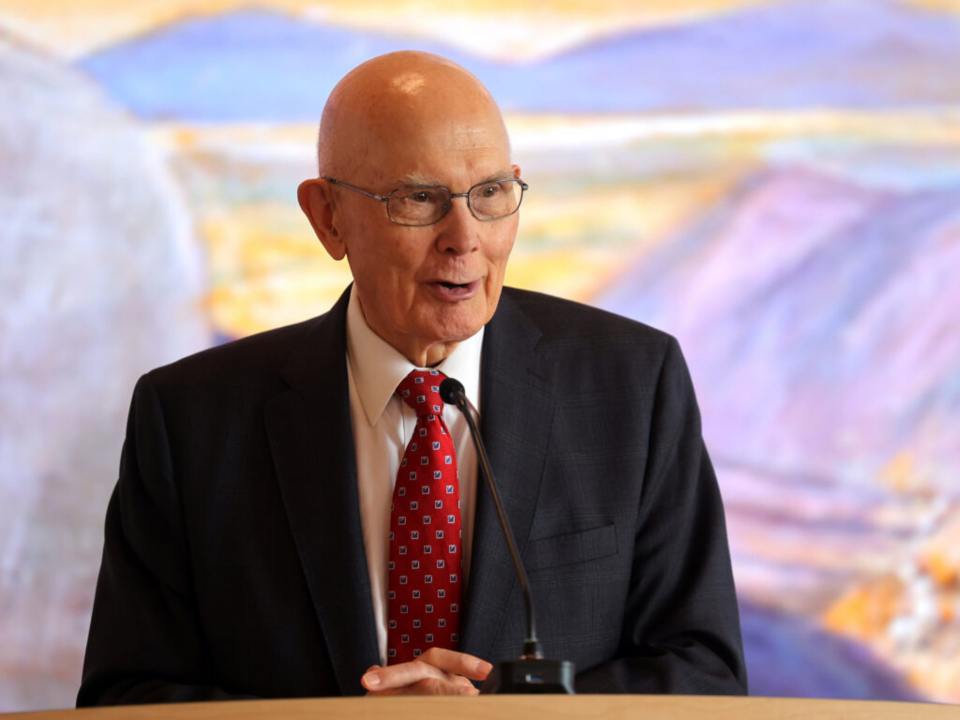
Oaks-Pioneer-Center-2021
President Dallin H. Oaks, first counselor in the First Presidency, speaks at SUPer DUPer Day inside the newly dedicated Pioneer Center on the grounds of This is the Place Heritage Park in Salt Lake City on Monday, July 19, 2021. Photo by Scott G Winterton, courtesy of Church News.Copyright 2021 Deseret News Publishing Company.Pioneer Traits and Principles
Though most present-day challenges are different from those faced by pioneer ancestors, President Oaks explained, “many are just as dangerous and surely as significant to our own salvation and those who follow us.”
For example, he compared the wolves that prowled around pioneer settlements to the drug dealers and pornographers threatening children today. The pioneer’s physical hunger can be paralleled by the spiritual hunger experienced today.
“Similarly, the more than 1,910 deaths on the pioneer trail are exceeded by the more than 2,200 pandemic deaths we have suffered just in Utah,” he said.
The pioneer’s foremost quality, President Oaks said, was faith.
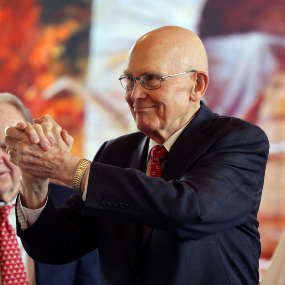
Oaks-Pioneer-Center-2021
President Dallin H. Oaks, first counselor in the First Presidency, greets people as he leaves after speaking at SUPer DUPer Day inside the newly dedicated Pioneer Center on the grounds of This is the Place Heritage Park in Salt Lake City on Monday, July 19, 2021. Photo by Scott G Winterton, courtesy of Church News.Copyright 2021 Deseret News Publishing Company.“With faith in God, they did what every pioneer does — they stepped forward into the unknown: a new religion, a new land, a new way of doing things. With faith in their leaders and in one another, they stood fast against formidable opposition,” he said.
Other qualities evident in the lives of pioneers were unselfishness, sacrifice, cooperation and unity. President Oaks cited the examples of the Saints who immediately responded to President Brigham Young’s call to rescue stranded handcart companies and those who obediently pulled up roots and applied their talents and lives to colonizing new areas.
“We praise what the pioneers’ great qualities have done for us, but that is not enough. We should also assure that these same qualities are guiding principles for each of us as we have opportunities to sacrifice for our nations, our families, our quorums, our members and our Church,” President Oaks said.
“This is especially important in societies that have exalted personal interest and individual rights to the point where these values dilute the powers of individual responsibility and sacrifice.”
Modern manifestations of these pioneer qualities are evident in private projects and common efforts requiring unity and cooperation. “You have already served well, but do you, like the pioneers, have the persistence to continue and endure to the end?” President Oaks asked.
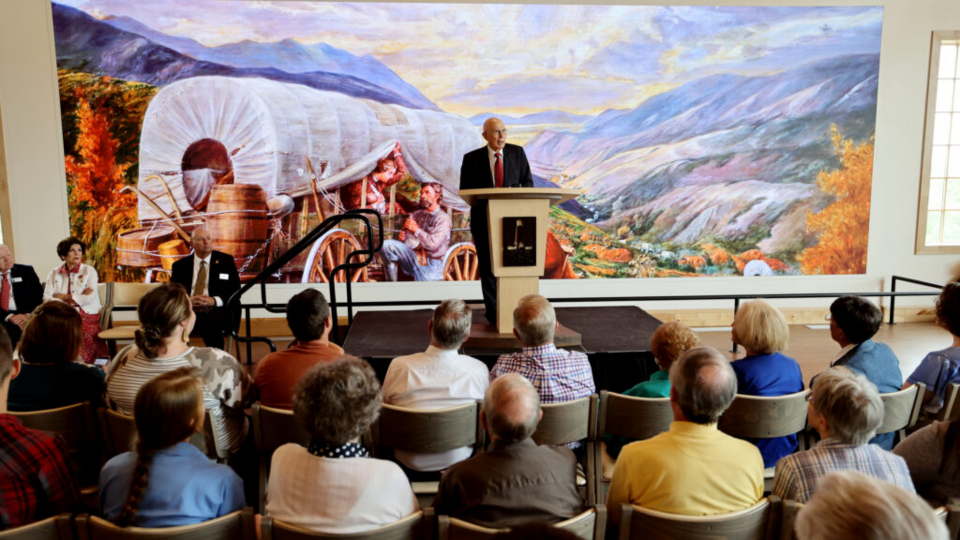
Oaks-Pioneer-Center-2021
President Dallin H. Oaks, first counselor in the First Presidency, speak at SUPer DUPer Day inside the newly dedicated Pioneer Center on the grounds of This is the Place Heritage Park in Salt Lake City on Monday, July 19, 2021. Photo by Scott G Winterton, courtesy of Church News.Copyright 2021 Deseret News Publishing Company.Inclusion
President Oaks concluded his remarks with a second question: “Are these pioneer celebrations academic, merely increasing our fund of experience and knowledge, or will they have a profound impact on how we meet our current challenges?”
Church leaders have repeatedly challenged Latter-day Saints to gain strength from the example of the pioneers. This includes welcoming new members, ministering to reawaken the faith of those who have strayed and reaching out to current refugees.
When the Saints were driven out of Missouri and later during the Nauvoo exodus, Church leaders were adamant that none of the poor would be left behind. “When the wagons and handcarts moved west, their movement was always one of inclusion, and no day’s journey ended until every straggler was accounted for,” he said.
As a modern-day example of rescuing stragglers, President Oaks referenced the Church’s 3,600 humanitarian projects ministering to people in 160 countries during 2020.
“With faith in our Creator and in following His leaders we are uniting in rescuing family members and others around us in great common causes for the benefit of our communities and our nations,” he said.
According to This Is the Place officials, this was the seventh SUPer DUPer Day event of its kind. Some 250 guests gathered to hear President Oaks’ remarks. Previous speakers include President Ballard, Elder Jeffrey R. Holland and Elder Gerrit W. Gong of the Quorum of the Twelve Apostles.
Sister Oaks said of the event, “For us, I think the best part was feeling those people and how much they loved their ancestry.”
Ellis Ivory, chair and executive director of This Is the Place Foundation, added: “Everybody who comes we hope they get the full spirit of what this place represents. We’re so fortunate to have had this set apart to commemorate not only the pioneers but the opening to the West.”
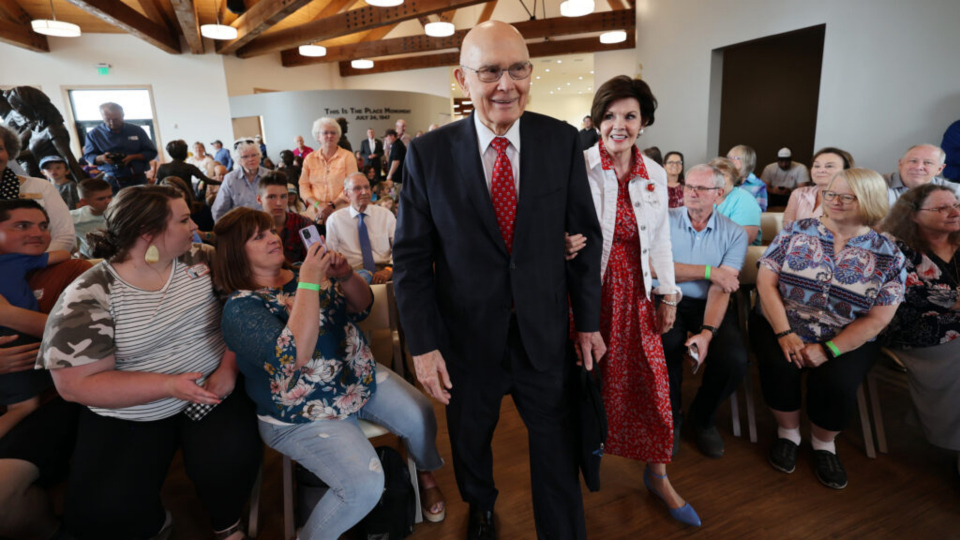
Oaks-Pioneer-Center-2021
President Dallin H. Oaks, first counselor in the First Presidency, greets people as he leaves after speaking at SUPer DUPer Day inside the newly dedicated Pioneer Center on the grounds of This is the Place Heritage Park in Salt Lake City on Monday, July 19, 2021. Photo by Scott G Winterton, courtesy of Church News.Copyright 2021 Deseret News Publishing Company.Copyright 2021 Deseret News Publishing Company
